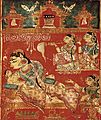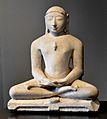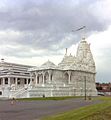Jainism facts for kids
Quick facts for kids Jainism |
|
|---|---|

The Jain flag In India
|
|
| Abbreviation | Jain |
| Scripture | Jain Agamas |
| Other name(s) | Jain Dharma |
Jainism is an ancient religion from South Asia (like India). It teaches people to be kind and peaceful to all living things. It has one of the oldest ways of thinking in India. Jains believe that your body and your soul are completely separate. Its main ideas are Nonviolence (called ahimsa) and not being too attached to things you own.
Jains believe the universe has always existed and will always exist. They also believe that every living thing has a soul. This soul has the power to become like a God. A soul that has won over its inner problems, like greed or pride, is called a jina. This means "conqueror" or "victor." These great souls are seen as Gods. Jains believe that controlling oneself is the way to become free or reach Godhood.
Jainism teaches that 24 special souls, called tirthankaras, are born over time. They help to bring back the Jain faith. Today, Jainism is a smaller religion. It has about 4.2 million followers in India. There are also growing communities in North America, Western Europe, Australia, and other places.
Jains have kept this old religion alive for a very long time. They have greatly influenced morals, government, and money matters in India. Jains have a long history of learning. They have the highest rate of people who can read and write in India. Jain libraries are the oldest in the country. Tamil Jains and Tulu Jains have lived in parts of Tamil Nadu and Karnataka since the 1st century BC. Even though Jains in South India might have some different customs, their main beliefs are the same as Jains in North India.
Contents
Key Beliefs of Jainism
Jainism has several important teachings that guide its followers. These ideas help Jains live a life of peace and self-control.
The Soul and Its Journey
- Every living being, from humans to tiny insects, has a soul.
- Each soul has the power to know everything, see everything, and feel endless joy. It can become perfect.
- Jains try to treat every living thing as they would treat themselves. They do not harm anyone and are kind to all.
- A soul is born into different forms (like a human, animal, or even a god) based on its past actions, called karmas.
- Every soul is responsible for its own life and what happens to it.
- When a soul gets rid of its karmas, it becomes free. It then reaches a perfect state of knowing and happiness.
Important Practices
- The Navakar Mantra is a very important prayer in Jainism. People can say it at any time of day.
- Non-violence is key. This means being kind and forgiving in your thoughts, words, and actions towards all living things. It also means respecting what others believe.
- Jains believe it is important to control your senses and your mind. They can pull you away from your soul's true nature.
- It is good to limit what you own and live a pure life that helps yourself and others. Owning things is not bad, but being too attached to them is. Not being possessive means balancing what you need and want, while not being controlled by your things.
- Jains are encouraged to spend time with holy and wise people. They should be kind to those who are suffering and patient with those who are difficult.
- It is important not to waste human life by doing bad things. Instead, people should try to grow spiritually.
- The main goal of Jainism is to free the soul from the bad effects of unhelpful thoughts, words, and actions.
- Jains mostly worship statues of Jinas, Arihants, and Tirthankars. These are souls who have conquered their inner struggles and reached a perfect state.
- The "triple gems" of Jainism are Right View, Right Knowledge, and Right Conduct. These show the way to freedom.
Understanding God in Jainism
Jainism does not believe in a single creator God who made the universe. Instead, the universe is seen as eternal. It was never created and will never end. It works on its own and does not need a higher power to control it.
Jains do believe in gods and hell beings. These beings are born and die, just like living things on Earth. Souls that live in the body of a god do so because of their good karma. These gods live happy lives where their wishes are often fulfilled. They also have more knowledge about material things and can sometimes know what will happen in the human world. However, when their good karma runs out, these souls leave the "god body." They are then reborn as humans, animals, or other beings.
Jains in Today's World
People who follow the path of the Jinas are called Jains. Most Jains live in India. With about four to five million followers worldwide, Jainism is smaller than many other major religions. Jain communities can also be found in Europe, the United States, Canada, and Kenya.
A survey in 2015-16 showed that Jains are the wealthiest community in India. The 2011 census found that Jains have the highest literacy rate (87%) in India for people aged 7 and older. The Jain community also has the most college graduates. If you only look at working-age adults, the Jain literacy rate in India was over 97%. Also, Jain men have the highest rates of working.
Images for kids
-
Jain temple painting explaining Anekantavada with Blind men and an elephant
-
Nishidhi stone, depicting the vow of sallekhana, 14th century, Karnataka
-
Praying at the feet of a statue of Bahubali
-
Rishabhdev, believed to have lived over 592.704×1018 years ago, is considered the traditional founder of Jainism.
-
Parshvanath Temple in Khajuraho
-
Jain temple, Antwerp, Belgium
See also
 In Spanish: Jainismo para niños
In Spanish: Jainismo para niños
 | Selma Burke |
 | Pauline Powell Burns |
 | Frederick J. Brown |
 | Robert Blackburn |
























